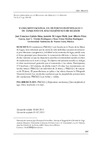Identificador persistente para citar o vincular este elemento:
https://accedacris.ulpgc.es/jspui/handle/10553/11216
| Campo DC | Valor | idioma |
|---|---|---|
| dc.contributor.author | Galván, José Francisco | en_US |
| dc.contributor.author | López-Walle, Jeanette M. | en_US |
| dc.contributor.author | Pérez-García, José Alberto | en_US |
| dc.contributor.author | Tristán, José L. | en_US |
| dc.contributor.author | Medina-Rodríguez, Rosa Elena | en_US |
| dc.date.accessioned | 2014-01-14T03:30:43Z | - |
| dc.date.accessioned | 2018-03-15T14:26:36Z | - |
| dc.date.available | 2014-01-14T03:30:43Z | - |
| dc.date.available | 2018-03-15T14:26:36Z | - |
| dc.date.issued | 2013 | en_US |
| dc.identifier.issn | 1886-8576 | en_US |
| dc.identifier.uri | https://accedacris.ulpgc.es/handle/10553/11216 | - |
| dc.description.abstract | El cuestionario PMCSQ-2 está basado en la Teoría de las Metas de Logro, hace referencia que las metas de cada individuo consisten en esforzarse para demostrar competencia y habilidad en los contextos de logro, siendo estas el factor principal para determinar la consecución del éxito o fracaso. Consta de dos variantes en que los deportistas perciben al entrenador creando un clima de implicación en la tarea ó al ego. El objetivo del presente estudio es indagar el clima motivacional generado por el entrenador a los atletas. Participantes; 474 hombres y 365 mujeres, de edades entre 9-23 años. Los instrumentos utilizados fueron: PMSCQ-2 en individual de 24 ítems; y PMSCQ-2 de conjunto de 29 ítems. El procedimiento se aplico a los atletas durante la Olimpiada Nacional Juvenil. Los resultados confirman que las propiedades psicométricas del cuestionario PMCSQ-2 son fiables y validas. | en_US |
| dc.description.abstract | The questionnaire PMCSQ-2 is based on the Theory of Achievement Goal, refers to the individual’s goals are to strive to demonstrate competence and ability in achievement contexts, these being the main factor in determining achieving success or failure. It has two variants in which athletes perceive the coach creating a climate of involvement in the task or ego. The aim of this study is to investigate the motivational climate created by the coach to athletes. Participants, 474 men and 365 women, aged between 9-23 years. The instruments used were: PMSCQ- singles of 24 items, and set PMSCQ-2 29 item. The procedure was applied to athletes during the OlimpiadaNacionalJuvenil. The results confirm that the psychometric properties of the questionnaire PMCSQ-2 are reliable and valid. | en_US |
| dc.format | application/pdf | es |
| dc.language | spa | en_US |
| dc.relation.ispartof | Revista Iberoamericana de Psicologia del Ejercicio y el Deporte | en_US |
| dc.source | Revista Iberoamericana de Psicología del Ejercicio y el Deporte [ISSN 1886-8576], v. 8, n. 2 | en_US |
| dc.subject | 61 Psicología | en_US |
| dc.subject.other | PMCSQ-2 | en_US |
| dc.subject.other | Deportistas mexicanos | en_US |
| dc.subject.other | Clima implicado al ego | en_US |
| dc.subject.other | Clima implicado a la tarea | en_US |
| dc.subject.other | Mexican athletes | en_US |
| dc.subject.other | Climate of involvement in the task | en_US |
| dc.subject.other | Climate of involvement in the ego | en_US |
| dc.title | Clima motivacional en deportes individuales y de conjunto en atletas jóvenes mexicanos | en_US |
| dc.type | info:eu-repo/semantics/article | en_US |
| dc.type | Article | en_US |
| dc.compliance.driver | 1 | es |
| dc.identifier.absysnet | 537108 | - |
| dc.investigacion | Ciencias de la Salud | en_US |
| dc.rights.accessrights | info:eu-repo/semantics/openAccess | es |
| dc.type2 | Artículo | en_US |
| dc.identifier.ulpgc | Sí | es |
| dc.description.sjr | 0,159 | |
| dc.description.sjrq | Q3 | |
| dc.description.sellofecyt | Sello FECYT | |
| dc.description.esci | ESCI | |
| dc.description.dialnetimpact | 0,0 | |
| dc.description.dialnetq | Q1 | |
| dc.description.erihplus | ERIH PLUS | |
| item.grantfulltext | open | - |
| item.fulltext | Con texto completo | - |
| Colección: | Rev. Iberoam. psicol. ejerc. deporte. 2013. v.8, n.2 Artículos | |
Visitas 5
90
actualizado el 11-ene-2026
Descargas
45
actualizado el 11-ene-2026
Google ScholarTM
Verifica
Comparte
Exporta metadatos
Los elementos en ULPGC accedaCRIS están protegidos por derechos de autor con todos los derechos reservados, a menos que se indique lo contrario.
